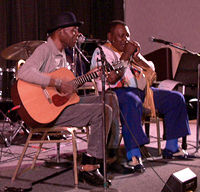| Columns Retired Columns & Blogs |
Bluesman Jimmie Lee Robinson Passes Away
I never "got" the spurs with which Jimmie Lee Robinson provided a percussive accompaniment to his singing and guitar playing, but I became a fan of Jimmie Lee's when I saw him perform on two successive nights at Acoustic Sounds' first blues festival in Salina, Kansas in September 1998. His subsequent live appearances at Consumer Electronics Shows and at HI-FI '99, Home Entertainment 2001, and HE2002 on behalf of Acoustic Sounds' associated APO label, were highlights of those events. (I took the accompanying photo at Jimmie Lee's May 31 HE2002 gig in New York with harmonica player Wild Child Butler.)
 I am saddened, therefore, to report that the 71-year-old bluesman passed away on Saturday, July 6. According to the Associated Press report, Jimmie Lee Robinson was found dead in his car on Chicago's southwest side with a single gunshot wound to his head. The death was ruled a suicide, the Cook County Medical Examiner's office said. Robinson, who took the Islamic name of J. L. Latif Aliomar in 2000, had been recently diagnosed with bone cancer, an irony indeed given his advocacy of the virtues of vegetarianism and exercise.
I am saddened, therefore, to report that the 71-year-old bluesman passed away on Saturday, July 6. According to the Associated Press report, Jimmie Lee Robinson was found dead in his car on Chicago's southwest side with a single gunshot wound to his head. The death was ruled a suicide, the Cook County Medical Examiner's office said. Robinson, who took the Islamic name of J. L. Latif Aliomar in 2000, had been recently diagnosed with bone cancer, an irony indeed given his advocacy of the virtues of vegetarianism and exercise.
Robinson began playing guitar in Chicago's famed open-air market on Maxwell Street in 1942, along with the likes of Big Bill Broonzy and Robert Nighthawk. In 1952 he and Freddie King teamed for a four-year performance partnership, and King later credited Robinson as being one of his earliest and most-influential guitar teachers. Robinson went on to play guitar and bass with Little Walter, Shakey Jake, Howlin' Wolf, Eddie Taylor, Elmore James, Jimmy Rogers, Jimmy Reed, and Magic Sam, to name but a few. He made his bandleader recording debut with Bandera Records in the late 1950s, recording such hits as "Lonely Traveller" and "All My Life," which was a successful cover for John Mayall in the 1960s and again in the '80s.
Robinson's music career slowed in the 1970s, and he went to work at various jobs including a stint for the Chicago Board of Education and as a carpenter, cab driver, and storeowner. He slowly began to perform again after a group of dedicated fans and musicians calling themselves The Ice Cream Men urged Robinson to join their shows in the late 1980s. Delmark Records revived Robinson's recording career in 1994 with the record Lonely Traveller, and Robinson again began to perform regularly, taking gigs worldwide.
He then recorded two self-produced albums for his Amina Records label, Guns, Gangs and Drugs (1996) and Maxwell Street Blues (1998), and he added guitar work and two solo performances to The Lost American Bluesmen release on the Midnight Creeper label in 1998 before signing with APO Records later that year. For APO, Robinson recorded Remember Me (1998) and All My Life (2001), the latter hitting the Living Blues radio charts. (All My Life is available on SACD, CD, LP, and 45rpm LP.) Jimmie Lee was also recognized with the 2001 Blues Trust Lifetime Achievement Award from Boston-based Blues Trust Productions.
Jimmie Lee Robinson most recently hit the headlines two years ago when he went on a hunger strike for 81 straight days in protest of the destruction of historic buildings in the Maxwell Street Market district, considered by many to be the birthplace of Chicago blues. The buildings had been scheduled for demolition to enable the University of Illinois at Chicago to expand its south campus. Despite the protest led by Robinson and other blues legends B.B. King, Buddy Guy, Bo Diddley, and Charlie Musselwhite, the buildings were demolished, but Jimmie Lee's action led to coverage of the issue on the Discovery Channel and in the New York Times, the Chicago Sun-Times, and the Chicago Tribune.
In a tribute on the Acoustic Sounds news page, Robinson was remembered as "APO Records' chief ambassador, and well beyond being a roster musician, he was a family member. He will forever be the label's Godfather." You can find more information on Jimmie Lee's life and work at his website.
- Log in or register to post comments




































